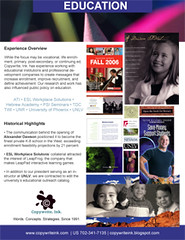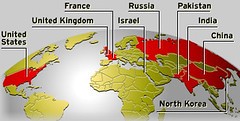Someone recently pointed out that “when you control the questions, you control the issue.” Nothing could be more true.
A few days ago, I offered comment about the Gibbons-Mazzeo 'scandal' as some people call it in a post titled Going for Gibbons. Until proven otherwise, I remain unwavering in my decision to dismiss the so-called incident even as Mazzeo, after days of coaching, emerged to hold her own press conference.
But for the purposes of communication study as it applies to the above quote, I propose flipping the issue by subjecting Mazzeo to an aggressive line of questioning that Congressman Jim Gibbons has endured over the last several days.
Why did she flirt with the congressman or, at minimum, why didn't she verbally reject such comments in the company of her friends? Why didn't she leave if she felt uncomfortable because of the unsubstantiated claim he played footies with her under the table? Why did she engage him again when she exited the establishment? Why did she allow her friends to leave her alone, if she was already uncomfortable with the congressman? Why did she agree to walk to her car with him, alone? Why didn't she re-enter the establishment and seek assistance? If she was as intoxicated as reported, why was she going to her car anyway? Would she have driven drunk? Why wasn't she given a blood test to determine her level of intoxication? Why did she refute her own testimony (that it was a misunderstanding) after being contacted by an attorney?
Suddenly, her allegations begin to evaporate. Unfortunately, those questions are not being asked enough. But as mentioned, when you control the questions, you control the issue. And right now, the questions are being controlled by the media and one of her attorneys, who happens to be active supporter of Gibbons' opponent.
A few days ago, I offered comment about the Gibbons-Mazzeo 'scandal' as some people call it in a post titled Going for Gibbons. Until proven otherwise, I remain unwavering in my decision to dismiss the so-called incident even as Mazzeo, after days of coaching, emerged to hold her own press conference.
But for the purposes of communication study as it applies to the above quote, I propose flipping the issue by subjecting Mazzeo to an aggressive line of questioning that Congressman Jim Gibbons has endured over the last several days.
Why did she flirt with the congressman or, at minimum, why didn't she verbally reject such comments in the company of her friends? Why didn't she leave if she felt uncomfortable because of the unsubstantiated claim he played footies with her under the table? Why did she engage him again when she exited the establishment? Why did she allow her friends to leave her alone, if she was already uncomfortable with the congressman? Why did she agree to walk to her car with him, alone? Why didn't she re-enter the establishment and seek assistance? If she was as intoxicated as reported, why was she going to her car anyway? Would she have driven drunk? Why wasn't she given a blood test to determine her level of intoxication? Why did she refute her own testimony (that it was a misunderstanding) after being contacted by an attorney?
Suddenly, her allegations begin to evaporate. Unfortunately, those questions are not being asked enough. But as mentioned, when you control the questions, you control the issue. And right now, the questions are being controlled by the media and one of her attorneys, who happens to be active supporter of Gibbons' opponent.




















